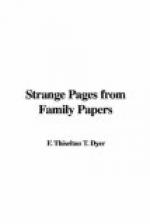“Now who is he that
bounds with joy
On Carroch’s side, a
shepherd boy?
No thoughts hath he but thoughts
that pass,
Light as the wind along the
grass.
Can this be he who hither
came
In secret, like a smothered
flame?
O’er whom such thankful
tears were shed
For shelter, and a poor man’s
bread!
God loves the child; and God
hath willed
That those dear words should
be fulfilled,
The lady’s words, when
forced away,
The last she to her babe did
say,
’My own, my own, thy
fellow guest
I may not be; but rest thee,
rest,
For lowly shepherd’s
life is best.’”
Many items of traditionary lore still linger about the Cumberland hills respecting the young lord who grew up “as hardy as the heath on which he vegetated, and as ignorant as the rude herds which bounded over it.” But the following description of young Clifford in his disguise, and of his employment, as given by Wordsworth, probably gives the most reliable traditionary account respecting him that prevailed in the district where he spent his lonely youth:—
“His garb is humble,
ne’er was seen
Such garb with such a noble
mien;
Among the shepherd grooms
no mate
Hath he, a child of strength
and state!
Yet lacks not friends for
solemn glee,
And a cheerful company,
That learned of him submissive
ways;
And comforted his private
days.
To his side the fallow deer
Came, and rested without fear;
The eagle, lord of land and
sea,
Stooped down to pay him fealty;
And both the undying fish
that swim,
Through Bowscale-Tarn did
wait on him,
The pair were servants to
his eye
In their immortality;
They moved about in open sight,
To and fro, for his delight.
He knew the rocks which angels
haunt
On the mountains visitant,
He hath kenned them taking
wing;
And the caves where fairies
sing
He hath entered; and been
told
By voices how men lived of
old.”
But one of the first acts of Henry VII., on his accession to the throne was to restore young Clifford to his birthright, and to all the possessions that his distinguished sire had won. There are few authentic facts, however, recorded concerning him; for it seems that as soon as he had emerged from the hiding-place where he had been brought up in ignorance of his rank, finding himself more illiterate than was usual, even in an illiterate age, he retired to a tower, which he built in a beautiful and sequestered forest, where, under the direction of the monks of Bolton Abbey, he gave himself up to the forbidden studies of alchemy and astrology. His descendant Anne Clifford, Countess of Pembroke, describes him as “a plain man, who lived for the most part a country life, and came seldom either to Court or London, excepting when called to Parliament, on which occasion he behaved himself like a wise and good English nobleman.” He was twice married, and was succeeded by his son, called Wild Henry Clifford, from the irregularities of his youth.




